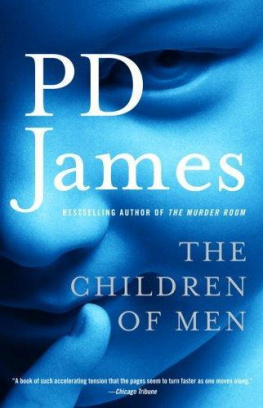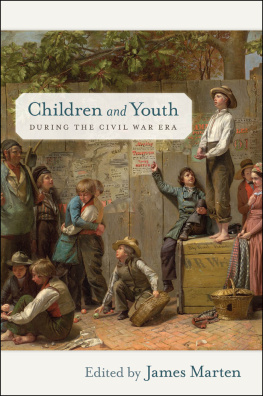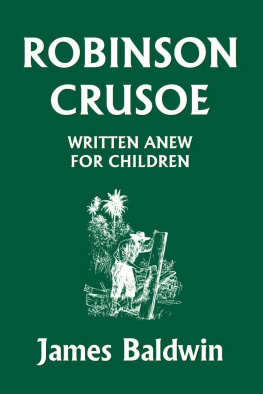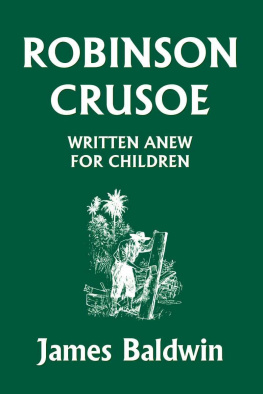P.D. James - The Children of Men
Here you can read online P.D. James - The Children of Men full text of the book (entire story) in english for free. Download pdf and epub, get meaning, cover and reviews about this ebook. year: 2006, genre: Detective and thriller. Description of the work, (preface) as well as reviews are available. Best literature library LitArk.com created for fans of good reading and offers a wide selection of genres:
Romance novel
Science fiction
Adventure
Detective
Science
History
Home and family
Prose
Art
Politics
Computer
Non-fiction
Religion
Business
Children
Humor
Choose a favorite category and find really read worthwhile books. Enjoy immersion in the world of imagination, feel the emotions of the characters or learn something new for yourself, make an fascinating discovery.
- Book:The Children of Men
- Author:
- Genre:
- Year:2006
- Rating:4 / 5
- Favourites:Add to favourites
- Your mark:
- 80
- 1
- 2
- 3
- 4
- 5
The Children of Men: summary, description and annotation
We offer to read an annotation, description, summary or preface (depends on what the author of the book "The Children of Men" wrote himself). If you haven't found the necessary information about the book — write in the comments, we will try to find it.
The Children of Men — read online for free the complete book (whole text) full work
Below is the text of the book, divided by pages. System saving the place of the last page read, allows you to conveniently read the book "The Children of Men" online for free, without having to search again every time where you left off. Put a bookmark, and you can go to the page where you finished reading at any time.
Font size:
Interval:
Bookmark:
CHILDREN OF MEN by P.D. James
Again, to my daughtersClare and Jane who helped
BOOK ONE
OMEGA
January-March 2021
On the morning of the Quietus, Theo awoke to a weight of vague unease, not heavy enough to be called anxiety, but a mild unfocused depression, like the last tatters of an unremembered but disagreeable dream. And then, even before he put out his hand to the light switch, he knew what the day held. It had been his habit all his life to devise small pleasures as palliatives to unpleasant duties. Normally he would now begin planning his route with care: a good pub for an early lunch, an interesting church to visit, a detour to take in an attractive village. But there could be no compensation on this journey whose end and purpose was death. He had better get there as quickly as possible, see what he had promised to see, return home, tell Julian there was nothing that he or the group could do, and attempt to put the whole unsought and unwelcome experience out of his mind. That meant rejecting the more interesting route, via Bedford, Cambridge and Stowmarket, in favour of the M4 to the M5, then northeast to the Suffolk coast by the Alt. It would be a faster if less direct and certainly duller route, but, then, he wasnt expecting to enjoy the drive.
But he made good progress. The Alt was in much better condition than he had expected, considering that the east-coast ports were now almost derelict. He made excellent time, arriving at Blythburgh, on the estuary, just before two. The tide was receding but beyond the reeds and mud flats the water stretched like a silken scarf and a fitful earlyafternoon sun struck gold in the windows of Blythburgh Church.
It had been more than twenty-seven years since he was last here. Then he and Helena had taken a weekend break at the Swan in Southwold when Natalie was only six months old. They had only been able to afford a second-hand Ford in those days. Natalies carry-cot had been firmly strapped to the back seat and the boot filled with the paraphernalia of babyhood: large packets of disposable nappies, sterilising equipment for the bottles, tins of baby food. When they reached Blythburgh, Natalie had begun to cry and Helena had said that she was hungry and should be fed now without waiting to get to the hotel. Why couldnt they stop at the White Hart at Blythburgh? The innkeeper would be sure to have facilities for heating milk. They could both have a pub lunch and she could feed Natalie. But the car park, he saw, was crowded and he disliked the trouble and disruption which the child and Helenas demands would cause. His insistence on pressing on for the few extra miles to Southwold had been ill-received. Helena, attempting ineffectually to pacify the child, had scarcely glanced at the gleaming water, at the great church, moored like a majestic ship among the reed beds. The weekend break had begun with the usual resentment and had continued with half-repressed ill-humour. It was, of course, his fault. He had been more ready to hurt his wifes feelings and deprive his daughter than to inconvenience a pub bar full of strangers. He wished there could be one memory of his dead child which wasnt tainted with guilt and regret.
He decided almost on impulse to lunch at the pub. Today his was the only car parked there. And inside the low-raftered room the black hearth of blazing logs which he remembered had been replaced with a two-bar electric fire. He was the only customer. The publican, very old, served him with a local beer. It was excellent, but the only food on offer was pre-cooked pies which the man heated in the microwave oven. It was an inadequate preparation for the ordeal ahead.
He took the remembered turn on to the Southwold road. The Suffolk countryside, crimped and barren under the winter sky, looked unchanged, but the road itself had deteriorated, making the drive as bumpy and hazardous as a cross-country rally. But when he reached the outskirts of Reydon he saw small gangs of Sojourners with their overseers, obviously preparing to make a start on repairing the surface. The dark faces glanced at him as he slowed and drove carefully past. Their presence surprised him. Southwold had surely not been designated as a future approved population centre. Why, then, was it important to ensure reasonable access?
And now he was driving past the wind shield of trees and the grounds and buildings of St. Felix School. A large board at the gate proclaimed that it was now the East Suffolk Craft Centre. Presumably it was open only during the summer, or at weekends, for he saw no one on the broad, unkempt lawns. He drove over Bight Bridge and entered the little town, its painted houses seeming to sleep in a post-prandial stupor. Thirty years ago its inhabitants had been mainly elderly: old soldiers walking their dogs, retired couples, bright-eyed and weather-beaten, walking arm in arm along the front. An atmosphere of ordered calm, all passion spent. Now it was almost deserted. On the bench, outside the Crown Hotel two, old men sat side by side staring into the distance, brown gnarled hands crossed over the handles of their walking sticks.
He decided to park in the yard of the Swan and have coffee before making his way to the north beach, but the inn was closed. As he was getting back into his car a middle-aged woman wearing a flowered apron came out of the side door and locked it behind her.
He said: I was hoping to have coffee. Is the hotel closed permanently?
She was pleasant-faced but nervous, and looked around before replying. Just today, sir. A mark of respect. Its the Quietus, you see, or perhaps you didnt know.
Yes, he said, I did know.
Wishing to break the profound sense of isolation which lay heavily on buildings and streets, he said: I was last here thirty years ago. It hasnt changed very much.
She laid one hand on the car window and said: Oh, but it has, sir, it has changed. But the Swan is still a hotel. Not so many customers, of course, now people are moving out of the town. You see, its scheduled for evacuation. The government wont be able to guarantee us power and services at the end. People are moving to Ipswich or Norwich. Why all the hurry, he wondered irritably. Surely Xan could keep this place going for another twenty years.
In the end he parked the car on the small green at the end of Trinity Street and began walking along the cliff-top path towards the pier.
The mud-grey sea heaved sluggishly under a sky the colour of thin milk, faintly luminous at the horizon as if the fickle sun were about once more to break through. Above this pale transparency there hung great bunches of darker-grey and black cloud, like a half-raised curtain. Thirty feet below him he could see the stippled underbelly of the waves as they rose and spent themselves with weary inevitability, as if weighted with sand and pebbles. The rail of the promenade, once so pristine and white, was rusted and in parts broken, and the grassy slope between the promenade and the beach huts looked as if it hadnt been cropped for years. Once he would have seen below him the long shining row of wooden chalets with their endearingly ridiculous names, ranged like brightly painted dolls houses facing the sea. Now there were gaps like missing teeth in a decaying jaw and those remaining were ramshackle, their paint peeling, precariously roped by staves driven into the bank, waiting for the next storm to sweep them away. At his feet the dry grasses, waist-high, beaded with dry seed pods, stirred fitfully in the breeze which was never entirely absent from this easterly coast.
Apparently the embarkation was to take place not from the pier itself but from a specially erected wooden jetty alongside it. He could see in the distance the two low boats, their decks festooned with garlands of flowers, and, on the end of the pier overlooking the jetty, a small group of figures some of whom he thought were in uniform. About eighty yards in front of him three coaches were drawn up on the promenade. As he approached, the passengers began to get down. First came a small group of bandsmen dressed in red jackets and black trousers. They stood chatting in a disorderly little group, the sun glinting on the brass of their instruments. One of them gave his neighbour a playful cuff. For a few seconds they pretended to spar, then, bored with the horseplay, lit cigarettes and stared out to sea. And now came the elderly people, some able to descend unaided, others leaning on nurses. The luggage hold of one of the coaches was unlocked and a number of wheelchairs dragged out. Last of all the most frail were helped from the coach and into the wheelchairs.
Font size:
Interval:
Bookmark:
Similar books «The Children of Men»
Look at similar books to The Children of Men. We have selected literature similar in name and meaning in the hope of providing readers with more options to find new, interesting, not yet read works.
Discussion, reviews of the book The Children of Men and just readers' own opinions. Leave your comments, write what you think about the work, its meaning or the main characters. Specify what exactly you liked and what you didn't like, and why you think so.








